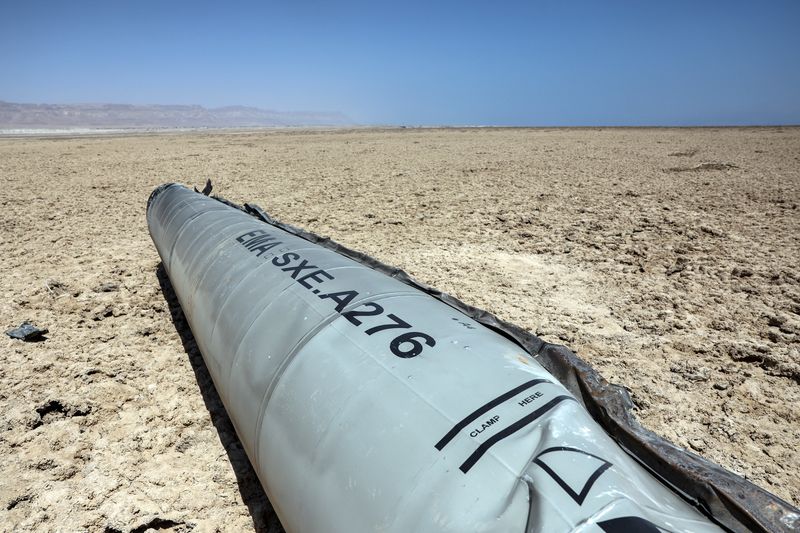By Phil Stewart and Idrees Ali
WASHINGTON (Reuters) - The United States hopes defense meetings in Riyadh on Wednesday will help advance a long-standing goal of building a regional missile shield, bolstered by Israel's successful defense against waves of incoming Iranian missiles and drones last month, U.S. officials say.
But it's unclear whether Gulf allies have the same confidence the U.S. would rush to their defense, or if those allies are willing to take the steps needed to truly integrate their defenses in a region that has longed hedged its bets, according to former U.S. officials and experts.
The May 22 meeting in Riyadh of the U.S.-Gulf Cooperation Council (GCC) comes just over a month after the United States, Britain and other allies helped Israel knock down hundreds of missiles and drones, mostly launched from inside Iran.
The meeting also comes against the backdrop of missile and drone attacks by Yemen's Houthis against commercial shipping in the Red Sea. Interceptions by U.S. and British warships have also demonstrated the power of Western air defenses.
A senior U.S. defense official, speaking to Reuters on condition of anonymity, said Gulf allies recognized that the successful defense of Israel was a result of years of defense integration among Israel's partners.
"It is not lost on (U.S. Gulf allies) that the effectiveness of defending against that very substantial, high-end barrage by Iran was not just because of the individual capabilities of the countries - Israel, United States, the UK - but the fact that there is a substantial amount of integration among those countries," said the official.
RELUCTANCE TO SHARE
The last GCC meeting was in February 2023. It is not clear if the upcoming meeting will produce any agreements.
U.S. officials have long acknowledged that many nations in the Middle East are reluctant to directly share sensitive defense information with each other, including radar data, given that it could reveal vulnerabilities.
Dana Stroul, who was the Pentagon's top Middle East policy advisor until late last year, said that countries in the Gulf would need to make a political decision on whether to move forward with regional intelligence sharing and investments in secure communications.
But there are also "ongoing doubts about America's willingness to support the defense of partners beyond Israel," Stroul said.
"Washington should also make clear to these partners that they can expect the same level of defensive support if Iran attacks them directly," said Stroul, who is now the director of research at The Washington Institute for Near East Policy.
Iran's attack by more than 300 missiles and drones caused only modest damage inside Israel. The April 14 strikes were Iran's first-ever direct attack on Israel and came amid soaring regional tensions over the more than seven-month-old Israel-Hamas war in Gaza.
During an April visit to Amman, U.S. Secretary of State Antony Blinken pointed to the U.S.-GCC working group meetings as he called for greater regional missile defense.
"This attack highlights the acute and growing threat from Iran, but also the imperative that we work together on integrated defense," Blinken said.
The U.S. delegation will include officials from the military's Joint Staff, the Missile Defense Agency, U.S. Central Command, U.S. Naval Force Central Command, Air Forces Central and the Defense Security Cooperation Agency.
All GCC members - which include Saudi Arabia, Kuwait, Oman, Bahrain, Qatar and the United Arab Emirates - will send delegations. Israel will not be sending a participant, a U.S. military official said, speaking on condition of anonymity.
Stroul noted that Gulf allies continue to purchase military systems from a mix of vendors from the U.S., Europe, China and other countries. This has put them at odds with the United States, which has warned that they cannot integrate Russian or Chinese systems with U.S. equipment for integrated air and missile defense (IAMD).

"Hence, if GCC militaries want to pursue IAMD, they must commit to 'buying American' or purchasing systems from other trusted sources," Stroul said.
The senior U.S. defense official, who spoke to Reuters on condition of anonymity, said the US-GCC meetings would hopefully see countries "put aside some of their doubts a little, some of their mistrust, and see the value" of integrated missile defense.